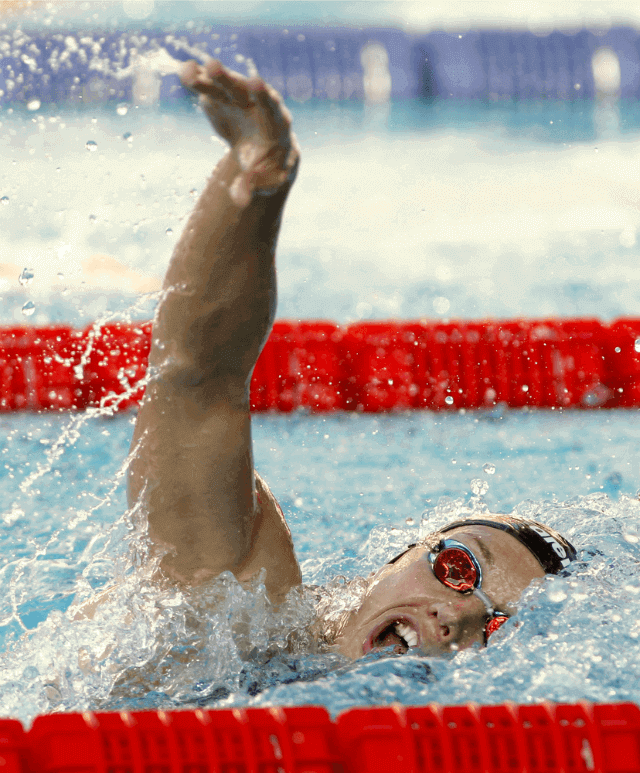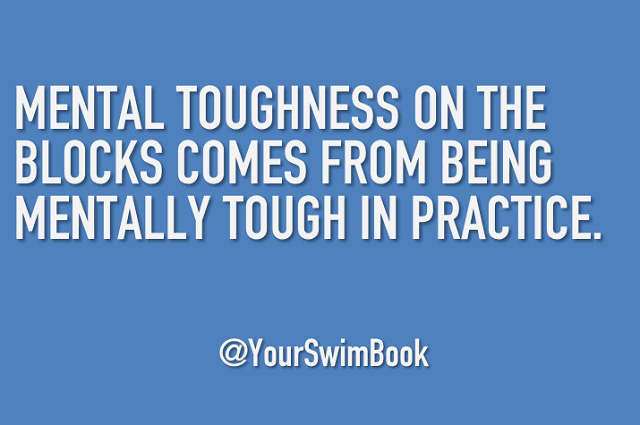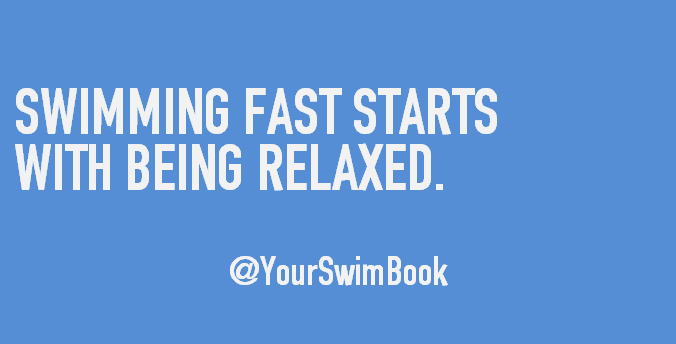The meters have been swum. The technique has been honed and perfected.
But no matter how well a swimmer trained in practice, inevitably they want to know how to make the most of their training.
How to know that once they get up on the blocks, that both mind and muscles will work together in harmony to produce a result that is deserving of the hard work put in over the months and years in the pool.
Here are 3 powerful ways to make sure that you are not only physically prepared to swim fast at the big meet, but mentally ready as well:
Be ready for conditions that are difficult or adverse.
This is a hard one, and something most swimmers struggle to accept as a necessary part of training.
Look:
Conditions are rarely perfect or even close when it comes down to the big meet. The weather is chilly. You’re late to the pool. You jam up your fingers on a fellow swimmer pushing off the wall during a jam-packed swim meet warm-up.
Things will happen.
How do we prepare for these moments? How do we develop the short term memory and the confidence necessary to be able to not only survive in conditions that aren’t ideal, but to be able to thrive in difficult circumstances?
In a word: practice.
If you are only willing to give a great effort at your swim practices when everything is going 100% your way, than you will expect and require the same level of perfect circumstances in competition to perform your best.
But if you can still set an in-practice best time at the end of a long week of training when you are bagged, or if you can hammer out the main set on a bad night of sleep, or with an extra draggy drag suit, or in a pool that has 9 other swimmers in your lane, than you begin to develop the type of resiliency and mental toughness that becomes so important when you step up on the blocks.
Don’t shy away from the challenging stuff in practice.
Be the swimmer that is not only willing to take on the hard sets, but be the swimmer that will do it when circumstances aren’t perfect, ideal, or even close to either.
Focus on the present.
Swim meets can be an overwhelming experience for the swimmer that gets lost in what is happening around them.
There’s the fast swimming of others that makes us doubt whether we did enough in training to fulfill our own objectives. There’s the sudden fishbowl effect of standing up on the blocks, having all your teammates, friends and family staring at you. And the sometimes paralyzing realization that the race you are about to swim is a short and one-time reflection of all the time, energy and hard work that you have put in over the past few months.
The simplest way to block out everything that is going around you—and some of the stuff that is going on in your own head—is to focus on the present.
After all, if you are getting lost in what the competition is doing, in the conditions of the meet, or on the high expectations of yourself for your performance, than you lose the relaxation and “mindfulness” that comes with focusing on the present.
Being ready to race means being relaxed (mentally, if not physically).
Think back to the last time you destroyed your best time in a 100-200 event.
How would you describe the way you felt in the water? Relaxed? Like you almost could have gone faster?
When you are relaxed, with slow and deep breaths, relaxed muscles, and a low heart rate you not only help ward off excess anxiety, you give your body a chance to perform in competition what you have been working on in practice.
SEE ALSO: The Swimming Taper: How to Swim Fast When It Matters Most
Focus on execution.
Swimming fast is great. Awesome. Super great-awesome, in fact.
There are fewer better and more satisfying feelings than looking up at the scoreboard and seeing a brand new best time and a number one beside our name (place, not lane).
We fixate so much on that desired result, of the outcome of the event that we don’t give enough attention to the things we should be doing right now in order to get prepared.
A straightforward way that I would keep my cool and focus on execution while racing was using a set of very simple cues.
There was one that my coach always emphasized, and that I remember most to this day. It was: “easy speed.”
Knowing that at times I could get a little, well, worked up behind the blocks and potentially go out like a bat out of hell on the front end of a race with little in reserve for a strong finish, before big races he would lay out a set of cues for each portion of the race.
The following cues are for a long course 100m race—
- For the start and breakout: “Explode to the surface!”
- For the first 25-50m: “Easy speed!”
- Into the turn: “Surf into the wall!”
- For the 50-75m: “Attack!”
- The last 25m: “Finish with everything you have!”
These cues were simple, and that was exactly the point.It kept me from overthinking things, and to focus on doing one thing at a time.
In a race you shouldn’t have to be thinking about technique—that was the point of those thousands and thousands of meters and yards in practice.
You shouldn’t get lost in what other swimmers are doing, and even though yes, it is a race, if you focus your entire race plan based on reacting to what other swimmers are doing it won’t work well for an overwhelming majority of swimmers.
Be willing to train in adverse conditions…
Focus on the moment…
Focus on execution.
See Also:
At What Age Should Swimmers Start Mental Training? Coaches and elite swimmers talk about how the difference is often mental when it comes to performance. Here are some thoughts and suggestions for when swimmers should start dialing in the mental side of the sport.
















